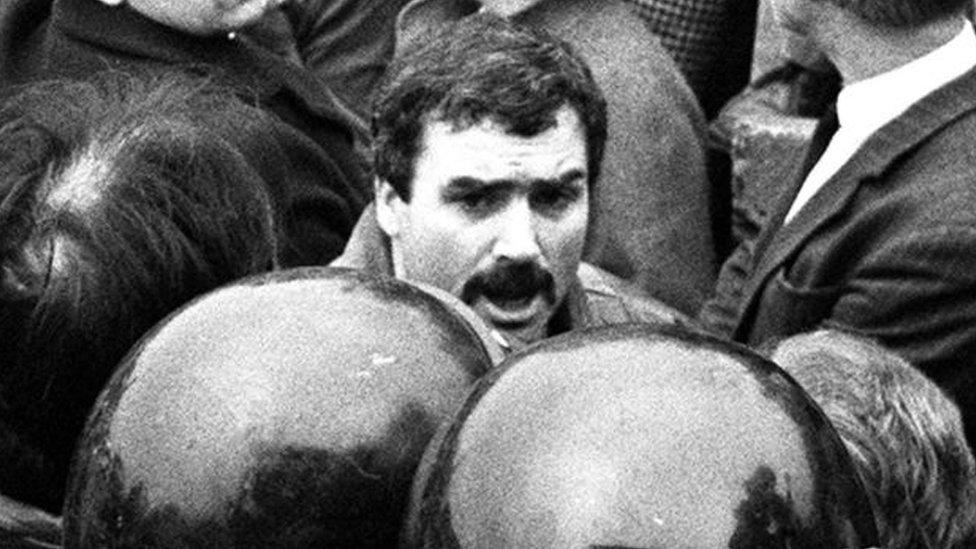Stakeknife: Report says Army's top IRA spy probably cost more lives than he saved
- Published
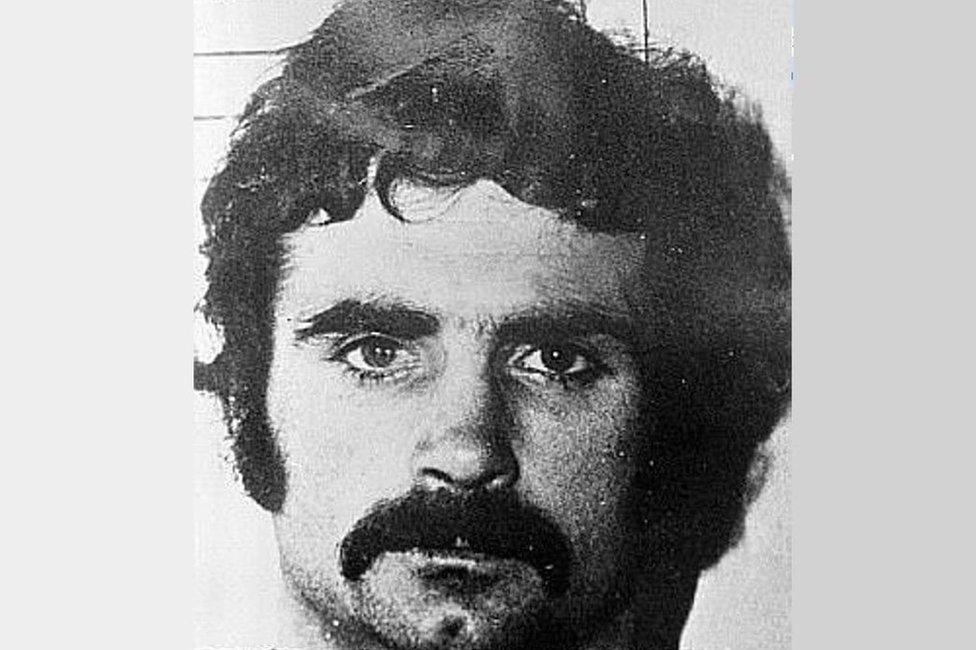
Freddie Scappaticci was the agent known as Stakeknife
An Army spy operating at the heart of the IRA during the Troubles in Northern Ireland probably cost more lives than he saved, a report has found.
Operation Kenova investigated the agent known as Stakeknife.
It said speculation he had saved hundreds of lives was wrong; it was more likely between high single figures and low double figures.
It found the security forces failed to prevent some murders to try to protect their agents in the IRA.
But, the report pointed out that it was the IRA leadership that had "commissioned and sanctioned" the actions of its so-called internal security unit - of which Stakeknife was a member - and "committed brutal acts of torture and murder".
The £40m investigation took seven years to examine the activities of Stakeknife, who was Belfast man Freddie Scappaticci.
The interim report called for apologies from the UK government and Irish republican leadership on behalf of the IRA.
Lawyer Kevin Winters, who represents the families of 12 victims, said the report was "a damning indictment of the state".
"The staggering takeaway message is that the state could have intervened to save lives," he said.
"We are left with the horrendous conclusion that both state and the IRA were co-conspirators in the murder of its citizens."
'This should not have happened'
The report's author, senior police officer Jon Boutcher, highlighted many failings of the security forces and the UK government, but acknowledged they were acting in an extremely stressful and violent environment.
Multiple murders
Operation Kenova linked Stakeknife to at least 14 murders and 15 abduction incidents.
Despite it being widely known that Scappaticci was Stakeknife, the Kenova Report did not officially confirm that. A further, more detailed report is due to be published by the Kenova team later this year.
However, the interim report said Stakeknife was "undoubtedly a valuable asset" to the security forces who "provided high-quality intelligence about PIRA [Provisional IRA] at considerable risk to himself".
The 208-page report added: "Albeit that his intelligence was not always passed on or acted upon and if more of it had been, he could not have remained in place as long as he did."
Mr Boutcher, who is now chief constable of the Police Service of Northern Ireland (PSNI), said claims Stakeknife saved hundreds of lives were based on "unreliable and speculative" assessments.
Mr Boutcher said murders that could, and should, have been prevented were allowed to take place with the knowledge of the security forces.
'You were not mad'
"Morality and legality of agents doing any harm - with the knowledge of the state - is something that we would never, ever allow today," he said.
Mr Boutcher also referred to the decision not to confirm Stakeknife's identity in his report.
"Stakeknife's identity has been exposed to Kenova, subject to confidentiality which I remain bound by and I cannot make his name public without official authority," he said.
So far the government has refused to give such authority.
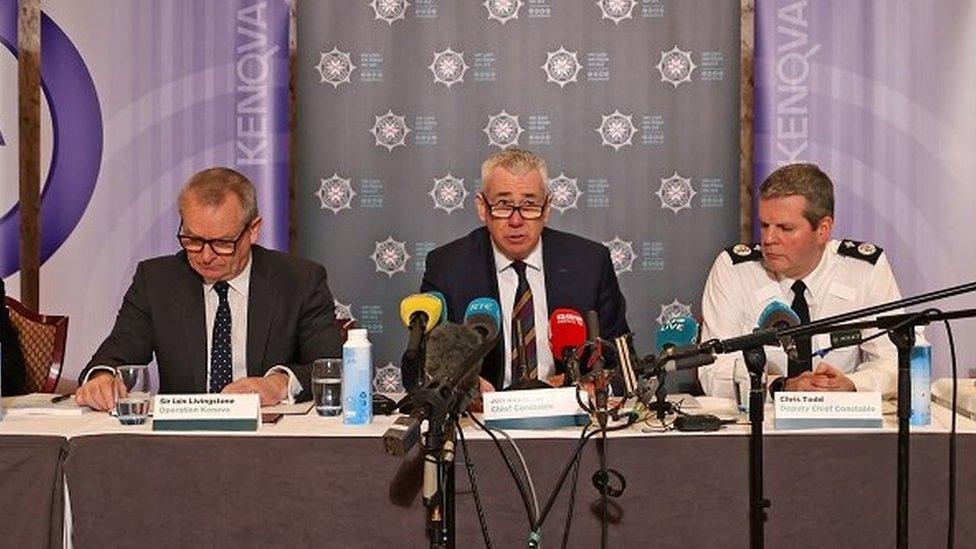
Sir Iain Livingstone, the officer in charge of Operation Kenova, PSNI Chief Constable Jon Boutcher, who previously led the investigation, and PSNI temporary Deputy Chief Constable Chris Todd at a press conference in Belfast on Friday
But Mr Boutcher added that in his view this position was "no longer tenable" and he expected the "government to authorise Kenova to confirm Stakeknife's identity in the final report".
Referring to Stakeknife's victims, Mr Boutcher said many of them had endured "endless delays, setbacks and unfulfilled promises in their search for the truth".
He said his report confirmed what many families had suspected - patterns of state intervention and non-intervention in the torture and murder of people accused of being state agents during the Troubles.
"You were not mad. This was happening and this should not have happened," Mr Boutcher told them.
Among the cases investigated by Operation Kenova was the killing of Caroline Moreland, a Catholic mother of three who was abducted and murdered by the IRA in July 1994.
Speaking before the report was published, her daughter Shauna said her main goal was to "get someone to say that her life mattered".
"I didn't want prosecutions, I didn't care about that. I just wanted answers," she said.
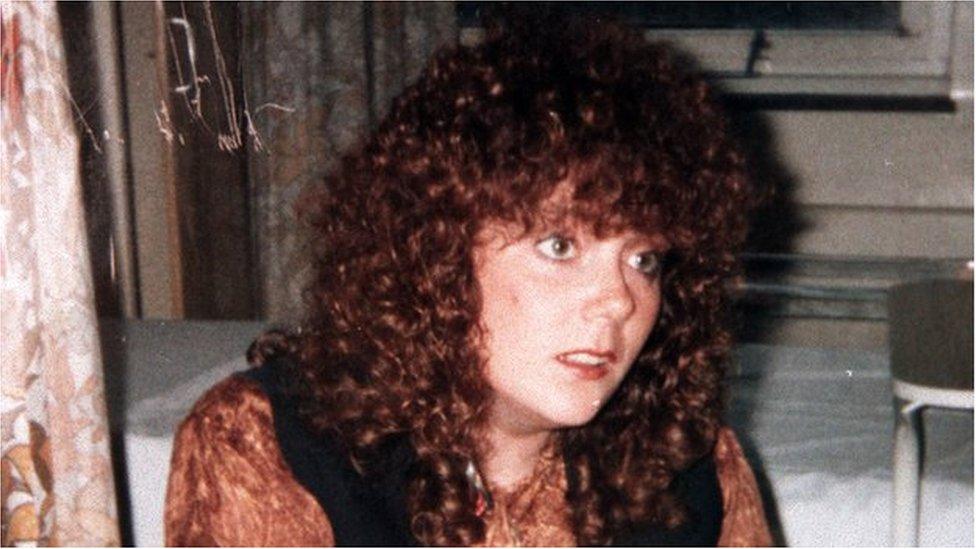
Caroline Moreland was abducted and shot dead by the IRA in July 1994, after they suspected she was an informer
The report called for an apology from the "republican leadership" for the IRA's "abduction, torture and murder of those it accused or suspected of being agents during the Troubles" and for the acknowledgement of "the loss and unacceptable intimidation bereaved families and surviving victims have suffered".
Sinn Féin was the political wing of the IRA throughout the Troubles. Since the IRA ended its violent campaign in 2005, the party is now considered the dominant voice representing Irish republicanism.
Sinn Féin deputy leader Michelle O'Neill, the first minister of Northern Ireland, was asked by the BBC if she would apologise.
Ms O'Neill apologised "for every single loss of life, and that is without exception" - something she also said in her first speech after becoming first minister.
Party president Mary Lou McDonald echoed Ms O'Neill's comments.
"To all those who have suffered such grievous loss, I am sorry for all the lives lost during the conflict and the hurt and loss endured, without exception," she said.
NI Deputy First Minister Emma Little-Pengelly, of the DUP, called on the republican leadership "to step up and own what has been done".
She asked for an acknowledgement for victims that "the murder and torture of people, informer or not, was absolutely wrong".
She added: "It's one thing to say, 'We are sorry for all deaths but that's very different to saying, 'It was wrong, it should not have happened, there was always an alternative'".
Ms Little-Pengelly said the informer and agent system was "a necessary part in tackling terrorism" but added that it is "also clear that things could have been done differently and there are serious lessons to be learned".
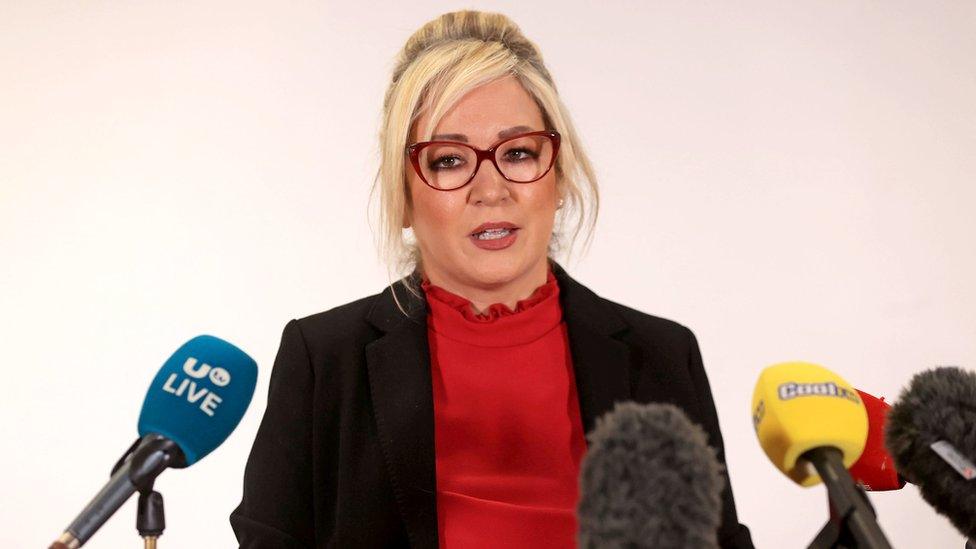
Michelle O'Neill apologised "for every single loss of life, and that is without exception"
Northern Ireland Secretary Chris Heaton-Harris said the report contained "several specific, very serious allegations that remain subject to consideration by the courts".
"It would not be right for the government to make any comment on the substance of the interim report until the conclusion of litigation related to it," he said.
"I would like to put on record again my deepest sympathy with all the families who lost loved ones during the Troubles - including as a result of the actions of the Provisional IRA," he added.
Tánaiste (Irish deputy prime minister) Micheál Martin said Sinn Féin "should unreservedly apologise and state unequivocally that the PIRA's activities and actions were wrong".
"The report makes clear the challenging circumstances facing those who worked to keep people safe throughout the Troubles," he added.
"However, it also states that serious crimes "were not prevented when they could and should have been" by the elements of the security forces, and said this was "a profound failure and an appalling dereliction of duty".
Scappaticci died in England in 2023 at the age of 77.
The report said speculation he was still alive was "unhelpful".
Mr Boutcher said: "I have independently verified when, where and how Mr Scappaticci died and can confirm he died of natural causes following an illness."
Prior to his death, the Public Prosecution Service (PPS) was considering whether to charge Scappaticci with murder and other offences, after receiving files of evidence from the Operation Kenova team.
Mr Boutcher wrote in the report, external: "I believed (the files) contained strong evidence of very serious criminality on the part of Mr Scappaticci.
'State and the IRA were co-conspirators in murder'
"We first attempted to submit these in October 2019 and it will never be known whether an earlier decision by the PPS [Public Prosecution Service] would have resulted in prosecution and, if so, conviction."
Nobody will be prosecuted as a result of the report.
In December, the PPS said 15 other people would not face any action.
Following this, there were further decisions not to prosecute anyone, including people who are alleged to have been IRA members and retired soldiers involved in agent handling.
Director of public prosecutions Stephen Herron said that "the PPS has not been funded adequately to progress legacy casework".
"The reality is that the PPS did not have sufficient resources to progress the Kenova decisions more quickly and that remains the position in relation to legacy cases more generally," he said.
He said that "skilled and experienced prosecutors and counsel" dedicated "the majority of their time, since 2020, to working on these cases".
"As is acknowledged within the report, any delay in decision-making was related to inadequate resources," he continued.
"I hope that the funding requirements of all parts of the justice system are recognised in future discussions about potential prosecutions in legacy cases and the need to progress these more quickly."
Who was Freddie Scappaticci and what did he do?
Freddie Scappaticci threatens a BBC reporter outside his home in 2003.
Freddie Scappaticci joined the IRA in the 1970s and towards the end of that decade was recruited by the Army as an agent.
Throughout the 1980s he operated within the IRA's so-called internal security unit - known as the "nutting squad".
Its primary purpose was to identify informers who were then kidnapped, tortured and shot dead.
Scappaticci himself was implicated in multiple killings while at the same time working as a spy, passing on intelligence about the IRA.
The IRA became suspicious of him around 1990 and stood him and his unit down.
He was unmasked in the media in 2003 and although he denied the allegation, he moved into hiding in England where he died in 2023.
What else does Operation Kenova report say?
The investigation found that the use of agents by security forces "undoubtedly saved lives during the Troubles" and "significantly degraded and debilitated the effectiveness of terrorist groups".
"Less frequently", it said, preventable and serious crimes took place and went unsolved and unpunished as security forces tried to protect their agents.
These included:
Murders committed by agents - including some cases where one agent murdered another
Murders of alleged or suspected agents, including cases where the murder was carried out as a punishment and to deter others from acting as agents - in some cases the victim was not actually an agent
Murders in some of these cases which were known about by the security forces in advance and could have been prevented
The report acknowledged some of these cases were "uniquely challenging" for the security forces, who were acting under "exceptionally stressful conditions and extreme time pressures".
The report said victims and families were failed both by the authorities and their communities, that victims were not protected and terrorists were not subjected to criminal justice.
It said the republican leadership had "failed to acknowledge and apologise for PIRA's murderous activities and the intimidation of families".
The IRA's so-called internal security unit noted, was responsible for "inhumane and degrading treatment and murder, including of children, vulnerable adults, those with learning difficulties and those who were entirely innocent of the claims made against them".
It said the unit sometimes accused people of being agents because its members wanted to "eliminate rivals" or kill the partners of those involved in extra-marital affairs.
It recommended that the longest day - 21 June - should be a day of remembrance for everyone injured or harmed during the Troubles.
Related topics
- Published8 March 2024
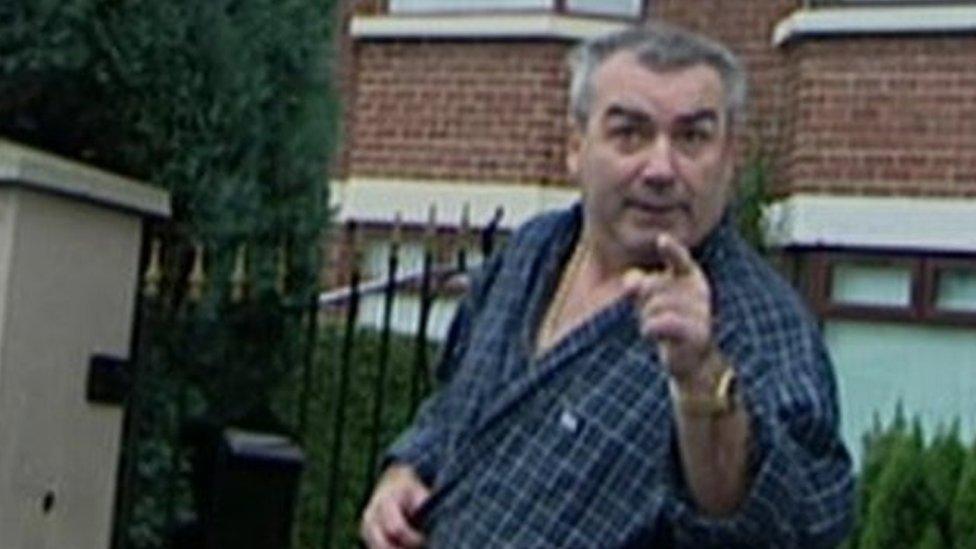
- Published7 March 2024
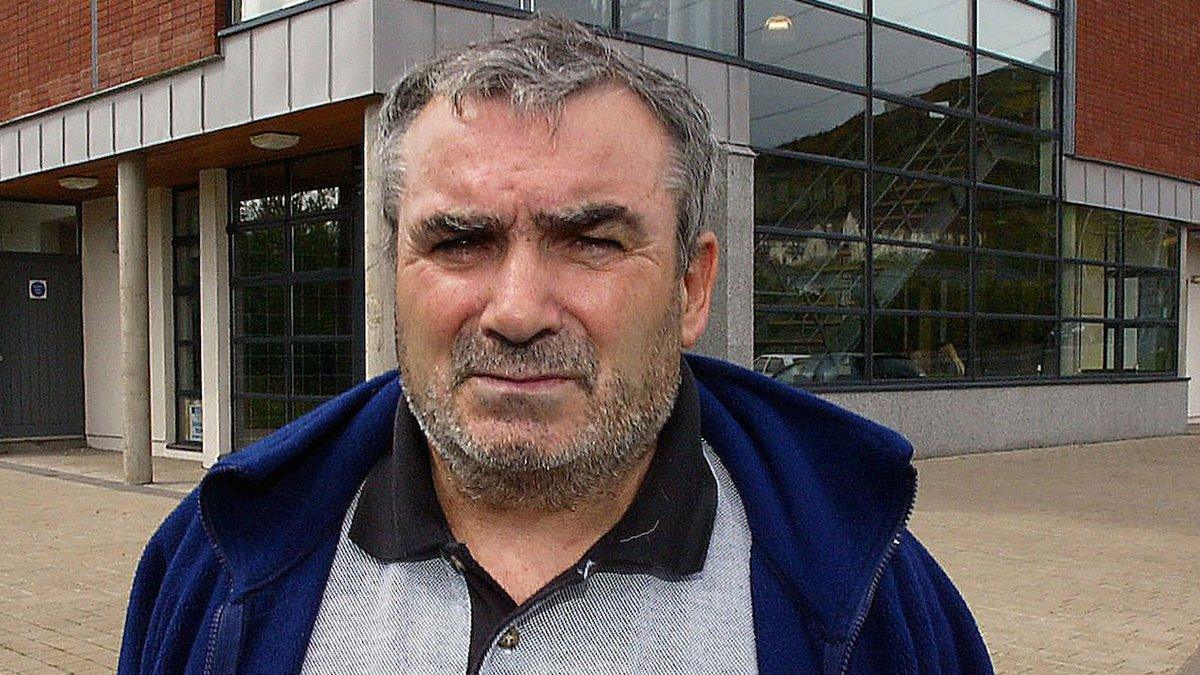
- Published8 March 2024
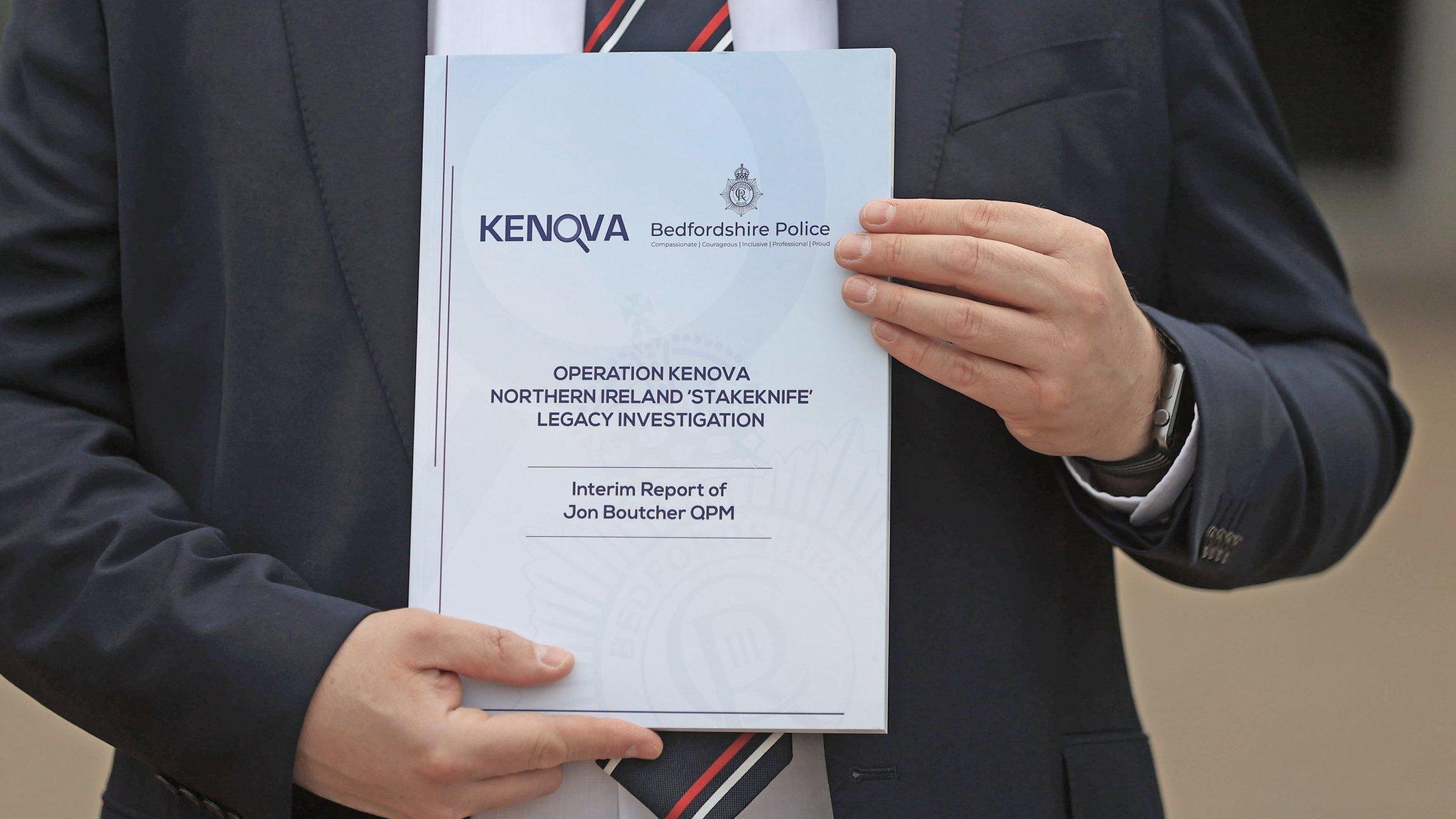
- Published7 March 2024
